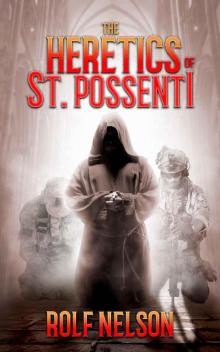- Home
- Rolf Nelson
The Heretics of St. Possenti Page 4
The Heretics of St. Possenti Read online
Page 4
“But that is not the Christian path, my newfound friend. The cross is mightier than the sword.”
“Faith backs up other skills, yes. But faith alone doesn’t put bread on the table, or fix a leaky faucet, or stop a robbery,” observed Bill.
“Does not your own faith teach the Trinity: the oneness of the Holy Spirit, the flesh of Jesus, and the Father?” Wang countered. “How can you not see that flesh and soul are one, and that you need to attend to the body and earthly spirit as well?”
“We do! In our soup kitchens–”
“No, no, no! More than that. More than the barest sustenance of survival. Men often must be physically strong before they can become spiritually strong. Physical strength becomes the gateway to spiritual strength. You do not teach algebra to men who cannot count. When a limb is broken, you must first heal the bone before you can rebuild muscle.”
“Jesus said—Mark 14:38—the spirit is willing, but the flesh is weak.”
“Then make the flesh stronger,” said John with a wide grin. “A good workout is good for all manner of things. Chicks dig muscles, too.” He flexed a rather large bicep and raised an eyebrow at Erika, who laughed good-naturedly.
“True,” she agreed. “A squishy lump of man-flab isn’t attractive to anyone. Even I can tell what a gal will whistle at, and it looks a lot more like John than it does like Michelin Man over there.” They all turned, using the mirror behind her to catch a quick glance at the soft, paunchy, shiny-headed and jowly middle-aged guy at a corner table whose jacket didn’t quite button around his ample middle.
“Think I’m handsome, eh?” joked John. “Knew you’d come around.”
“Kinda, but you’re not my type.”
“What is your type, exactly?”
“Married.”
“Ah, don’t you have that backward?” Thomas asked.
“Nope. Why do the hard work of finding out if someone is worth catching? Let someone else do that. Then, take him.”
“That’s messed up,” said Mickey.
“But if you can take him,” asked Thomas, “should you not be worried that he will leave you, too?”
She shrugged. “The way of the world. Catching men is easy. You’re programmed to stick it in anything female, young, and breathing… and for some those qualifiers are optional. Nailing down and keeping a man worth catching is a lot harder, because most of them aren’t.” She flipped her bangs aside and gave the men a small smile. “Sorry. Look around you. Beaten up, beaten down, worn out, and cast aside by everything they come in contact with. The smart ones see the game is rigged and don’t play. The nice but dumb ones walk into the spin-cycle and end up here… Present company mostly excepted, of course.”
“And I thought I was cynical,” said John dryly.
“Oh, you are,” joked Mickey. “But you have to work behind a bar or in a prison for a while to reach her level.”
“I’ve never heard of a monk leaving our monastery to get married who later divorced,” observed Wang.
“Don’t get me wrong, John. You’re a nice guy,” Erika said. “Steady work. Smart. And I’m sure you’d defend anyone you get serious about. But you don’t exactly strike me as the fatherly sort, with enough of a paycheck that a gal could stay home and take care of the kids.”
“Hey, I’m self-employed. My flexible schedule means I–”
“Most gals want the security of a regular mega-corp paycheck and man who comes home at a regular hour, not the stress of being the wife of an entrepreneur.”
“Those guys get laid off, fired, and forced to train their replacements… as you just pointed out.”
“Did I say chicks were rational, John?” Erika replied in good humor. “The illusion of security is fine for most of them. That’s all it ever really is.”
“Hah, so that’s why the PTSD flashbacks scare them,” Mickey said. “It bursts the bubble of control they think they have to see that in a man they think they know at an instinctive level. They know he’s capable of lethal violence, and for him to be suddenly unpredictable, not playing with a full deck, or by the rules… Yeah, makes sense.” Erika and Wang nodded at his insight. Thomas and John frowned thoughtfully.
Mickey continued. “War is insane—the opposite of civilization. But you have to be able to fight and win wars if you want your civilization to survive. Like Machiavelli said, you can’t care what ought to be. You have to realize how things are. Just like guys are programmed to stick it in anything female and living, women are programmed to seek stability and safety, because childrearing is a long-term project, and they know they can’t physically compete with men. A guy could have a hundred kids that survive and never meet any of them. A woman can only care for a couple and do a good job of it without a lot of help from someone.”
“Some single moms are doing pretty well,” objected Erika.
“With alimony, welfare, and other transfer payments while they farm out the education to daycare and the schools, entertainment to Hollywood, the feeding to the formula and package-food manufacturers, the security to the cops, and the discipline to nobody. But sure, they are doing a great job totally on their own.”
“Now who’s cynical?”
“All of us. Well, except for maybe the good Father and Master Wang here,” replied Mickey.
“I bet they’re both working on it,” added John. Wang chuckled.
“God does not encourage cynicism,” replied Thomas.
“Humans sure do,” said Erika.
“Mostly because we have such different reproductive strategies,” John said, “and government turns all the incentives upside-down and cattywampus so that people work against their own best interests while thinking they are doing themselves a favor. Demanding that we act equal when we so obviously are not is counterproductive.” The others looked at him, puzzled.
“The short-term thinking that’s taken over—once we got away from an ag economy where you had to think about seasons and long-term yearly cycles and childcare on your own, and we started focusing on weekly paychecks and quarterly reports and minute-by-minute click-bait—people now are completely unaware of long-term trends and actions. Inconvenient information disappears down the memory hole in an hour, as if it never happened. Hell, some of my younger students, their parents can’t even keep track of what topic they are supposed to be studying, let alone grades or content.”
Wang nodded sagely in agreement. “Some of my novices, too. Screens with the whole world of action, videos, women, and diversions. As potent and addicting as any drug. They need to be in the real world to see and understand the history we instill. They do not understand the fight for survival, the cruelty, the primal drives and instincts of man, or the forces of nature. They see our monks demonstrate forms and want to do the same, but they are unwilling to put in the time or study or effort to achieve.”
“Yup,” John said. “Want to be bad-asses, but no concept of how much work it takes. What’s funny is that even a bit of training puts them so far above those with only movie-training that they can still do pretty well. It doesn’t take a long time to get good at any martial art, but it does take both many years and natural talent to become great. But if you can’t even be bothered to put in a year of regular practice and weights…”
There was a moment of silence as they all paused to take a drink, and to think. The news show on one of the screens in the corner across from them began showing security footage from a robbery attempt gone wrong. It ended with many shots fired, lots of broken glass and flying debris from bullets that missed the intended targets, the three would-be robbers all running away unscathed, and the two shopkeepers standing in the doorway waving empty guns with slides locked back.
Bishop Cranberry was appalled that any of the five were armed. Wang and Vritra were appalled by the hate, the flailing arms and legs, and the general lack of self-control and situational awareness. Mickey and John were appalled by the marksmanship and gun handling—or rather the lack of it.
�
�Now you see, it wouldn’t have taken more than a week’s training to make that go much better,” said Mickey. “Poor draw. Horrible aiming and trigger control.”
“But the shopkeepers’ possessions are insured,” Cranberry objected. “Why commit lethal violence over mere things? Why is killing to keep a few dollars better than killing to take a few dollars?”
“A world of difference, Padre. It’s human nature—for men, at least—to defend what is rightfully yours. All animals have the natural right to self-defense. And often the perp doesn’t want just things. He wants the thrill of control.”
“Rape, for example, mostly isn’t about sex, but about power,” interjected Erika.
“Because if you have power over a woman, you control her reproductive ability,” Mickey agreed. “And the goblin may want to get rid of witnesses. Now, what if that shopkeeper needs those ‘mere things’, his ‘few dollars’, to support his family? And even if he makes a stand as hopeless as the three hundred at Thermopylae, he still might hurt the robber badly enough that he doesn’t rob again.” Mickey picked out a popper. “But one of the best things about fighting back is that it reduces the PTSD to almost nothing.” He popped the spicy bite into his mouth.
“What? I’m afraid I don’t follow,” said Cranberry.
John picked up the thread while Mickey crunched on his pepper. “PTSD. Post Traumatic Stress Disorder. After the excitement—the Traumatic Stress—is over, your brain has to cope with it. If you are in a totally FUBAR situation and are helpless, and you have no training or understanding from before it happens, your mind tends to not cope so well. If you know you are righteous and you fought well, then there won’t be much PTSD, and it’ll be easily treated, even if you ultimately failed to defend yourself.
“The best way for a woman to survive a rape and not have psych problems afterward is to fight back vigorously and to know she did everything she reasonably could. If she just follows the rapist’s directions, though, she often gets a lifetime of shrinks, counselors, broken relationships, and Stockholm Syndrome. Causes for PTSD are many; treatments for men and women vary somewhat because their psychologies are more than a bit different. There is a lot of overlap though. Cognitive restructuring helps with both, but the specifics used are often not the same.”
“Why then,” Thomas asked,“do I only hear about PTSD with soldiers, and why is it such a recent thing?”
“The news spins the narrative they want. Making returning soldiers look crazy is useful to some politicians. But it’s not just soldiers. Experiencing any serious trauma, physical or mental, can cause it. TBI from artillery, or IEDs, or other explosions causes physical damage that can be very difficult to treat. It’s worse with close-up, inexplicable, or unexpected violence. Bomber pilots almost never get PTSD. Someone who has trained and prepared for it and fights back well with solid righteousness is virtually immune, too.
“And it’s not recent at all. Used to be called shell-shock and then combat stress reaction or combat fatigue. Traumatic stress has been around forever, but a thousand years ago society was different. You could watch the battle from the city walls, so you knew what the soldiers went through. In ancient Greece soldiers went into battle standing next to family—brothers, cousins, fathers, sons, nephews—so everyone around you understood the hell you had been through. They’d gone through it, too. These days only a tiny percentage have any idea… any idea at all. The others just don’t get it. When you are surrounded by people who don’t understand, who can’t understand, and don’t have a good support network…”
“Few monks ever have that problem,” said Wang quietly. “We teach them to be strong physically, and they are surrounded by men who understand what they have done and are going through. We teach them to be at peace with the world around them.”
“We employ different strength exercises and mental conditioning at our dojo, with similar results,” added John. “People have different physiologies and needs and cultures. So we adapt it to them. Whites tend to have better upper-body strength and less flexibility than Asians, so we have a somewhat different plan. Eastern Africans like Somalis have great endurance but less speed. Western Africans have great speed but generally less endurance, so we train them a bit differently. Patience is easy to teach to some cultures. Very hard to teach others. So different training regimens.”
“And how you deal with someone trying to escape or avoid gang life is different than a typical middle-class working man in his mid-forties,” amplified Vritra. “Neither wants to be seen as weak, but what they understand as weak is different. Both see physical courage and confidence as being manly even if my definition of that word is very different from yours. The flashbacks from the Sandbox can really be difficult for a relationship for all sorts of reasons. He thinks it reflects very badly on himself. So he’s depressed, and his wife picks up on that. It scares her to see him without self-control or self-confidence, and frequently out of a job. We had to let a man go last month from chronic absenteeism, for PTSD he refused to treat, because of what seeing a psychiatrist would imply and entail. He thought the treatment undignified and the counselors ignorant.”
The group moved away from the bar to a larger table and then to a back room, where they were eventually joined by a half-dozen regular patrons of the Howling Puffin, each of whom had an interesting and sometimes troubled background. Cranberry listened to the wandering conversation as the others talked about the issues they’d observed, occasionally adding a brief anecdote of his own. It was a long and often philosophical discussion of everything; Plato’s view of how things ought to be versus Machiavelli’s description of how things are, the psychology and physiology of humans in combat (they knew an astonishing amount about how the body reacted to physical damage, stress, and exercise), ancient military tactics, the best strength-training regimens for different body types, the problems and attractions of gang life, relationship dynamics, and the best foods for getting or keeping healthy.
Vets
The victims of PTSD often feel morally tainted by their experiences, unable to recover confidence in their own goodness, trapped in a sort of spiritual solitary confinement, looking back at the rest of the world from beyond the barrier of what happened. They find themselves unable to communicate their condition to those who remained at home, resenting civilians for their blind innocence.
—David Brooks
The next morning Thomas Cranberry had a list of places to go and people to see and a pounding headache. He hadn’t had anything remotely like a hangover since the unfortunate event in seminary that almost got him expelled.
After a bite of breakfast, some strong coffee, and a long walk to clear his mind and to think about the night before, he packed five bag lunches in a day-pack and headed for his first rendezvous near a bridge.
It was an ordinary sort of overpass, and like so many of them, there were a few homeless men not far from it. Seeing three who fit the descriptions he’d been given, he approached them with a smile and confidence. He stopped about ten feet away from the tallest of three who stood in a group near the abutment.
“Timothy?” he asked. They eyed him suspiciously, and the tallest nodded slowly. “John from the dojo said you’d be here.”
“What’cha want?” Timothy asked.
“A story. To be more specific, I want to offer you a meal…” He proffered the sacks. “…in exchange for telling me how you ended up here.”
None of the three moved. “Heard enough sermons in my life, Rev. The shelter has sandwiches in an hour. No deal.”
“No, no sermons, I swear. Just listening. I have fresh fruit, yogurt, and trail mix with lots of nuts and seeds and–”
“Yeah, John sent you. He’s crazy on health food…. Since you’re here, any loose change?”
“There are three one dollar bills in each bag.” He mimed tossing the sack lunches, giving them each time to get a hand free while keeping their distance. He tossed one to Timothy and then waited.
The homeless
man caught it at arm’s length and, after checking it quickly, nodded. “Looks clear.” He passed it on to the nearest man. Thomas tossed the next bag to Timothy. Checking it, he nodded and handed it to the third man before catching one for himself, which he also checked suspiciously but quickly.
So far, these men were as expected and as described by John. Paranoid, cautious, with a hunted look and demeanor. Timothy took a bite of apple, savoring the crunch for a moment, before talking around a half mouthful. “So… what’cha want, exactly?”
“As I said, I want to listen for a while. I met John at the dojo only very recently. After speaking with him for a while, I find that it seems that I’m missing something. So I promised him that I would listen to you. To find out what the men I normally do not meet have to say. If I ask questions, they will be honest questions, seeking understanding, not rhetorical questions that lead into a sermon.”
The bishop paused, then asked, “What happened that led you here? What is the plan? How do you get through the days and nights?”
* * *
It was a long, slow afternoon, and Thomas found himself biting his tongue repeatedly to keep his promise to refrain from sermonizing, though they were obviously testing his self-control by baiting him early on. But after a while, he found himself wearing his old seminary “debate” hat—not as an inquisitor looking for a “win” but as an astute interlocutor and counselor driving delicately for the truth, pinning down exactly what the three meant and not simply hearing the “surface meaning” of their words. He spent much time in thought ensuring his questions were neutral, asking what these men had seen as their options, not pointing out what he thought they should have done.
All three were mentally sharp, moderately well educated, as fit as their circumstances allowed, and they had—in the blunt phrasing of the bartender—been shit on by everything and everyone.

 Insanity's Children
Insanity's Children The Stars Came Back
The Stars Came Back Back From the Dead
Back From the Dead The Heretics of St. Possenti
The Heretics of St. Possenti